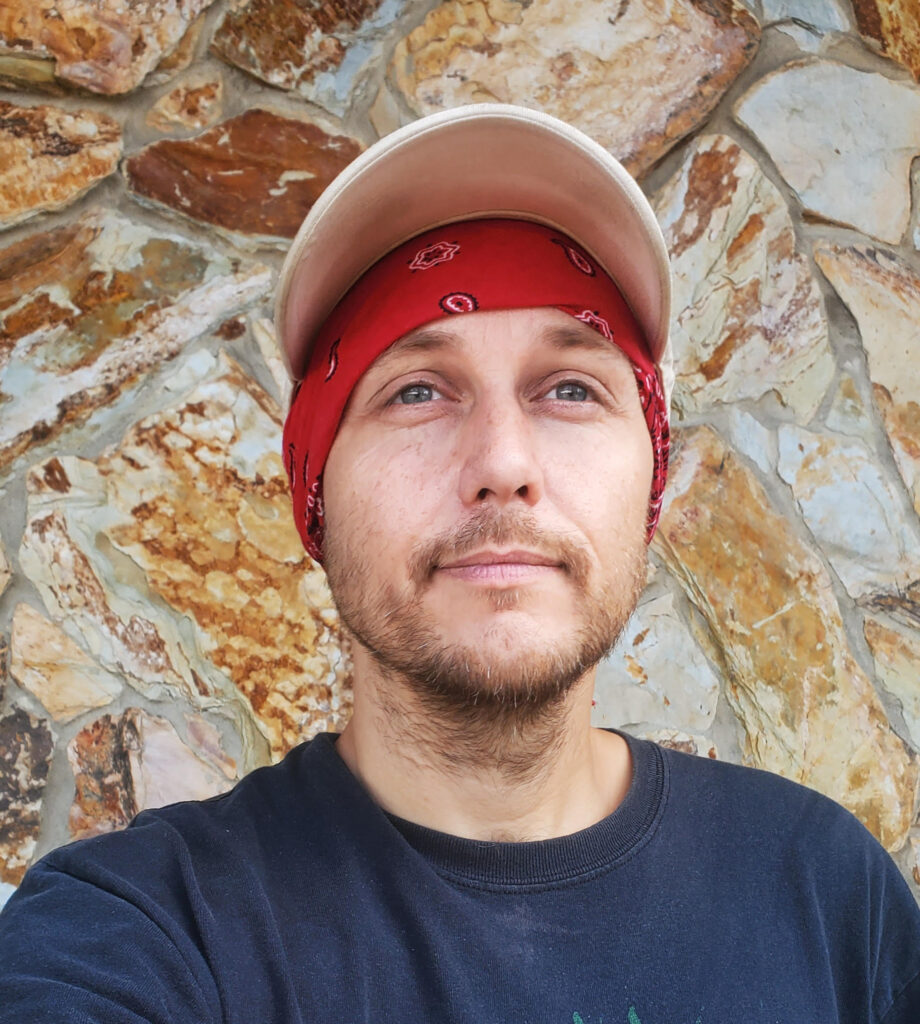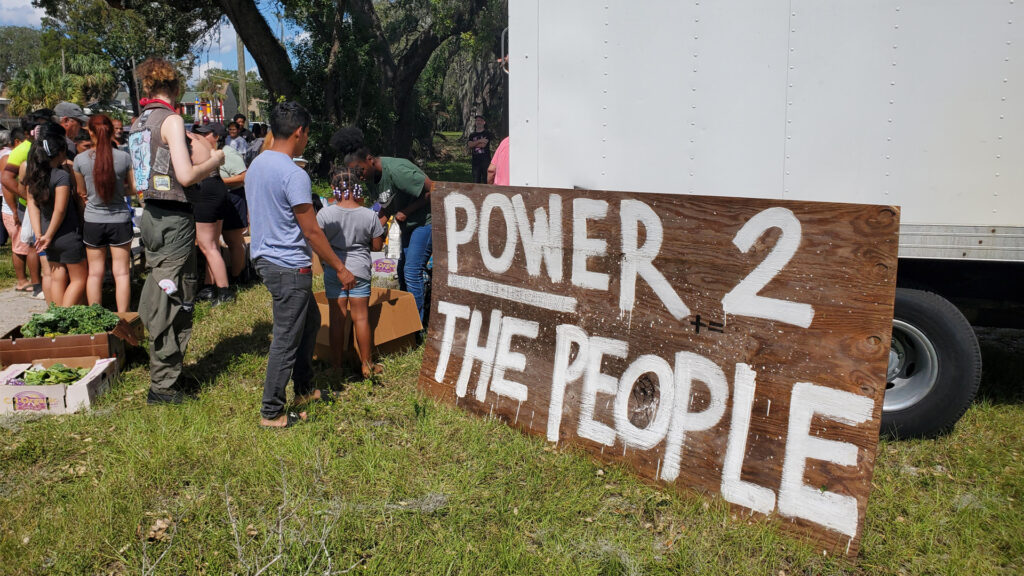By David Vaina
The following Q&A was conducted with Jimmy Dunson, an author, poet and co-founder of Mutual Aid Disaster Relief. Based in the Tampa Bay area, Dunson has a passion for building mutual aid survival programs and has been involved with many movements for collective liberation including refugee solidarity efforts, peer support, farmworker justice, solidarity-based disaster relief and more.
How would you define mutual aid in late 2024?
Mutual aid is a voluntary, reciprocal exchange among equals. Mutual aid is how beings survive and thrive, and is the foundation of every healthy economy and ecology. Put simply, we share. Exploitative, unjust and parasitic economic systems are not inevitable, and there is ample evidence that communities left to our own devices, especially after disasters, default to relationships of mutual support, generosity and love.
This was a rough hurricane season for the west coast of Florida. How did you help people in your community deal with the effects of the storm?

Recently, we have had two very impactful hurricanes that hit the Tampa Bay region: Hurricane Helene and Hurricane Milton. I have been helping people in my community with accessing gas, food, supplies, herbal medicine, solar power, water, Gatorade, salvaging and moving belongings, gardening and other needs that arise.
But the most important thing I did to help people in my community recently, I did without knowing at the time. I don’t lock the back of our Mutual Aid Disaster Relief box truck. I find the practice of locking up supplies that are meant to be distributed and shared to be counterintuitive and unnecessary. And a number of people who had nowhere else to go, stuck out in the elements during Hurricane Milton, survived by finding refuge in the back of the truck through the storm.
I see the type of mutual aid you do as more than just a one-time passive reaction to hurricanes, extreme heat, flooding, etc. Instead, I see it as a political and even joyful practice that is being put into place as a more permanent way of living in this new epoch of climate change. How would you respond to my rationale?
I have been involved in mutual aid movements for over 20 years and, although there are times of heightened activity around climate-related disasters or other crises, more and more I have come to understand that a total exodus from capitalism is possible and necessary. If we quit our jobs and work for something real, we may struggle more financially and may have to lean on others for our survival more often, but we get to spend every moment free, doing what we wish, caring for others and being the change we wish to see in the world.
We can have the courage and creativity to chart new paths in which we use our time, skills, talents, knowledge, connections, resources, labor and passion in service of each other’s well-being and survival instead of advancing a company’s profits. And we can do this permanently, in large enough numbers, to turn the tide from profit-motivated economic relationships to care-and-regeneration-motivated economics.
How is mutual aid a specifically ecological practice? What sorts of things, if any, are being done that we might see as activities to renew the health of the planet? Regenerate the natural world?
Mutual aid’s first language isn’t English. If we are serious in our desire to learn and practice mutual aid, we must seek right relationship with its more ancient practitioners. The birds, butterflies, bees, wildflowers, trees, mountains, water and other beings kindly share their wisdom on what earth as a beloved home and the sharing of resources can be like if we have the humility and openness to shift perspective beyond the narrow human-built world. While there are innumerable things we can all do to care for earth, earth, like all beings, has the innate ability to regenerate and heal herself.
The best thing we can do is allow that regeneration and healing to unfold naturally, to stop harming and stop being complicit in oppression and harm. If we are able to do this, we will be able to see clearly how Earth is renewing, regenerating and healing us in transformative, deep and lasting ways, even if it’s not always ways we expect or find comfortable. In this age of transition, it helps to remember that economic and political regimes are impermanent and subject to fall, worlds have died and been reborn before, and Earth need not die for people’s worlds to die.
I’m interested in how mutual aid is actively planning for an even stormier future here in Florida and elsewhere. What preparatory steps is your group taking to deal with what’s projected to be some very dire moments?

We have a saying here in Florida: “What’s a city underwater to people who can swim?” There’s a lot of loss and trauma that comes with disasters. But that’s not the end of the story. After every disaster people instinctively shake off the spell of business as usual and relate to each other in authentic and meaningful ways. We got this. You got this. Humanity’s got this. If storms and other disasters increase in frequency and magnitude so much that a return to normal becomes impossible, then we won’t return to normal.
We can return, instead, to right relationship with ourselves, each other and the Earth. Stormy winds can blow us in any direction, but if we have our compasses and our north stars, we can and will make it home. The best thing we are doing to prepare is holding onto our compasses and encouraging others to do likewise. The best way to learn something is by doing it, and mutual aid and climate survival are no exceptions.
Where do you see mutual aid in five years? Ten years? What will it be grappling with?
I don’t know what will happen when, but the future I envision is the hundreds of thousands or millions of people with experience creating, implementing and building survival programs during and after disasters setting our sights on doing what needs to be done on an even larger scale, cleaning up the plastics in the ocean and the satellite debris in the atmosphere, disarming imperial militaries, reclaiming land back for coastal wetlands and indigenous sovereignty, and safely remediating and healing all the waters, land and communities impacted by centuries of oppressive toxins and toxic oppressions.
Once we understand deeply in our core that we are the ones we’ve been waiting for, we won’t surrender our agency to politicians or billionaires, and instead do what the Earth would do in human form and meet the moment in ways future generations can look back on with pride.
This Q&A was conducted by David Vaina, who has a Ph.D. in political theory and has helped fund, develop and operate Florida nonprofits over the last 15 years. His new book, “On-Ramps to a New Civil Society: Mutual Aid at the Edges of the Anthropocene” (Rebel Hearts), was published this fall. Vaina lives in rural north Florida.
Sign up for The Invading Sea newsletter by visiting here. To support The Invading Sea, click here to make a donation. If you are interested in submitting an opinion piece to The Invading Sea, email Editor Nathan Crabbe at ncrabbe@fau.edu.



